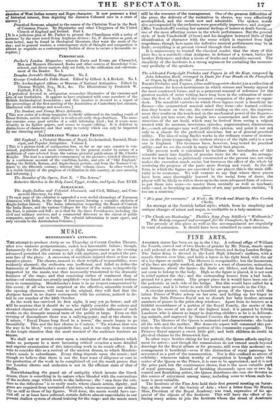MUSIC.
MENDELSSOHN'S ANTIGONE.
THE attempt to produce Antigone on Thursday at Covent Garden Theatre, after two ominous postponements, ended in a lamentable failure; though, fortunately for the gifted composer, a slight improvement as the evening advanced permitted the curtain to fall with applause, and respited the present fate of the piece. A succession of accidents injured three or four consecutive pieces. The chorus, unused to their weight of responsibility, were evidently alarmed; the orchestra was inefficient, and failed to define the harmonies of Mendelssohn's score; the interest of the scene, so imperfectly supported by the music, was thus necessarily transferred to the dramatic business of the stage; and that consisting rather of sentiment than of action—of sentiment too greatly amplified—was found at the outset tedious even to sermonizing. Mendelssohn's fame is in no respect compromised by this event: if all who were surprised at the effectless, miserable result of the opening choruses, will turn to the original, they will find that the Antigone heard in no degree corresponds with his creation, _noticed in detail in our number of the 26th October.
As the work has survived its first night, it may yet go better; and all Will be anxious that it should do so who rightly consider the serious and elevated character of the composition, and the probable influence of such Works on the dramatic musical taste of the public at large. Even on this evening of discomfiture there was a rallying-point; and at the chorus in E minor, "Royal Danae long lived in a tower," the music began to go beautifully. This and the last chorus in C minor, " 'Tis wisdom that sees the way to be blest," were exquisitely fine; and it was only from restraint at the tragic situation that the more musical of the audience forebore an encore.
We shall not at present enter upon a catalogue of the accidents which Make us postpone to a more becoming critical occasion a more detailed and regular examination of this interesting work in its scenic effect. It is vain to consider this as a revival of the ancient drama, to which Mendelssohn's music is subordinate. Every thing depends upon the music; and though we believe that there is not the least want of diligence or care in the production of the work to be complained of, yet the result proves that Our London chorus and orchestra is not in the efficient state of that of Notwithstanding the grand air of antiquity which invests the Greek drama, there is something in its nature when blended with the conventions of the modern stage which tends to the ludicrous: the "step from the sublime to the ridiculous" is so easily made, where classic action, dignity, and grace are required from untrained choristers, whose movements are ordinarily as stiff as those of lay figures. Well done, the music would have carried off, or at least have softened, certain defects almost unavoidable in our Present shallow system of choral training for the stage: and the music must
still be the resource of the management. One of the greatest difficulties of the piece, the delivery of the recitatives in chorus, was very effectively accomplished, and the result new and admirable. The spoken words also accompanied by the orchestra were powerfully impressive; and Antigens' (Miss Vandenhoff) venting her natural feelings of horror at death furnif--one of the most affecting scenes in the whole performance. But the general style of both Vandenhoff (Crass) and his daughter betrayed little of that identification of character with the scene which is expected from high tragedians; though here again the defective musical performance may be in fault: everything is at present viewed through that medium.
It is unnecessary to remind the classical reader, that the story of this piece lies in a nutshell—that Antigone, in defiance of a tyrant, buries her brother Polynices; and that a tissue of deaths and calamities succeed. The simplicity of the incidents is a strong argument for curtailing the unnecessary prolixity of the speakers.






















































 Previous page
Previous page